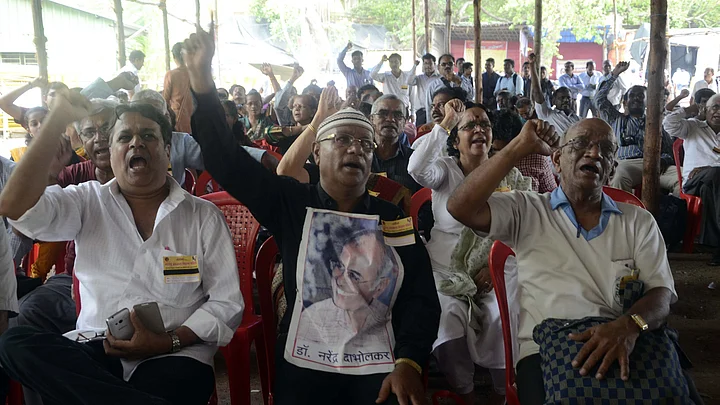The CBI, at last, has one of the suspects in rationalist Narendra Dabholkar’s murder in custody. Virendra Tawade and his accomplice did not kill Dabholkar because of some personal dispute or hatred. They killed him for being a rationalist and an atheist.
Tawade was a member of Sanatan Sanstha, a right-wing Hindutva organisation that has systematically made controversial, threatening statements. In 2015, one of its members was arrested for the murder of Govind Pansare, a Marathi author and CPI leader.
Currently, the CBI is looking into 119 bank accounts and 169 phone calls made by absconding Sanatan Sanstha members in connection to the murders in the 2009 Goa blasts.
The Goa Congress has called for a ban on the organisation, citing its divisive ideology and the fact that its members have been involved (allegedly) in the assassination of rationalists and scientists. In October 2015, Maharashtra CM Devendra Fadnavis had said that he would act against Sanatan Sanstha if any evidence was found against the organisation.
Now, with the fresh arrests, the demand for banning Sanatan Sanstha has been renewed. Fadnavis, however, has said that the issue is “political”. Even Tushar Gandhi, Mahatama Gandhi’s great-grandson, has said banning is not the answer. The relatives of those who have been killed, however, are disappointed.
In the past though, institutions have been banned. Most notably, the Students Islamic Movement of India (SIMI) was banned for the activities of some of its members. So, are the activities of Sanatan Sanstha comparable to those of SIMI? And if so, is there a discrepancy in how ‘radical’ organisations are treated based on their ideological affiliations?
SIMI: Militant Perhaps, But Terrorists?
SIMI was originally the student wing of the Jamaat-e-Islami, but split from its parent organisation because of its hard-line stance on issues like its support for Hamas in Palestine and the Iranian revolution. In a 2008 interview, Sayeed Khan, a former member of SIMI, described how the organisation became increasingly radical after the demolition of the Babri Masjid and the rise of the Hindu Right in India.
Ideologically, elements within SIMI were radicalised and reportedly clashed with Hindu right-wing organisations. The organisation was first banned on 27 September, after the 9/11 attacks in the US, and the ban has been subsequently renewed.
As for violent or terrorist activities, things are a little more complicated. The SIMI itself has not carried out a terror attack on Indian soil. However, the Indian Mujahideen (IM) – an organisation that is allegedly behind numerous attacks on Indian soil – is supposed to be comprised of at least some former SIMI members.
Extremist Hindutva and Violence
The Sanatan Sanstha was formed in 1980 and is registered as a charitable trust in Goa. However, the organisation has been courting controversy for some time now. It has consistently taken a somewhat obscurantist stance, often against minorities, atheists and rationalists. Its members have also been accused of violent activities multiple times.
- In 2008, members of the organisation were arrested for planting a crude bomb during the screening of a Marathi play.
- Vinod Tawade is also a suspect in the 2009 Margao blasts.
- According to a report in The Indian Express, Sanatan Prabhat, the organisation’s mouthpiece, published a caricature showing Govind Pansare being impaled three days before he was assassinated.
- Sanatan Sanstha members have been accused of killing rationalist Narendra Dabholkar.
Clearly, there is enough suspicious activity to deem the organisation a dangerous one. While the IM emerged after SIMI was banned – allegedly with some former members of the student organisation in its ranks – Sanatan Sanstha is still very much active.
What’s the Difference?
The murder of missionary Graham Staines and his two sons by a mob led by Bajrang Dal member Dara Singh; the Malegaon blasts allegedly committed by members of Hindutva organisations; and the various acts of violence carried out by Sanatan Sanstha members – none of these caused any bans.
SIMI may well have been a radical organisation, and perhaps ought to have been banned. Or one may agree with Tushar Gandhi, that the culture of banning needs to be stopped.
There’s only one problem. Organisations, regardless of their political and religious dispensation, need to be treated with some degree of parity.
As the demand for banning the Sanatan Sanstha by Opposition parties grows in Goa and Maharashtra, one can ask why it should be treated differently from SIMI by the government.
